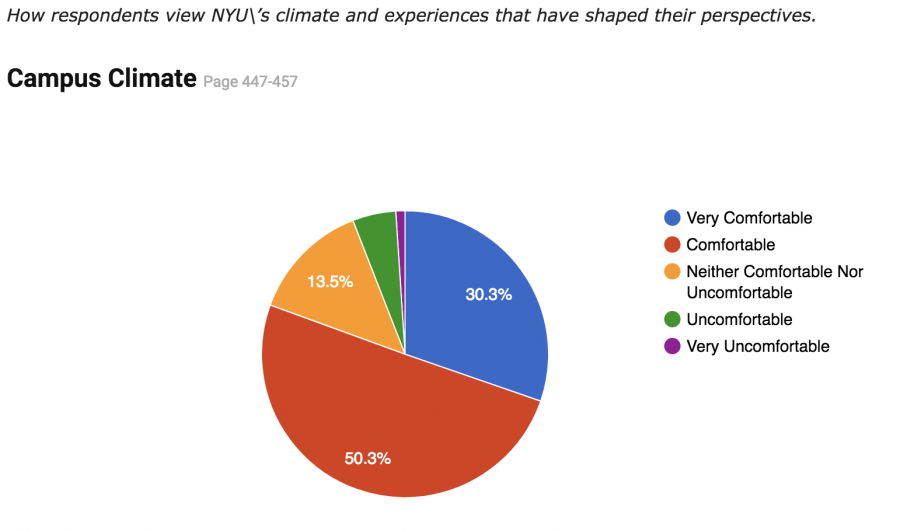Thirty-one percent of all students, faculty, staff and administrators took the heavily advertised Being@NYU survey in the fall 2017 semester, administered as a means of gauging quality of life at the university. On Monday, the survey’s findings, detailed in a 600-page report, were released to the NYU community.
Over the past several days, a team of WSN editors read the entirety of the report to identify its key findings. Below are five important takeaways.
Different constituencies responded to the survey at varying rates.
Response rates featured a heavy gender disparity. 55.1 percent of NYU community members identify as women while 44.5 identifies as men; however, 60.2 percent of survey respondents identified as women while only 36.3 percent identified as men.
Some racial and ethnic groups responded to the survey at significantly higher rates than others. 70.3 percent of people of Asian descent responded; 40.3 percent of people of African descent responded; 35.4 percent of white people responded and 27.2 percent of Hispanic/Latinx/Chicanx people responded.
NYU boasts strong financial diversity, yet many students struggle with affordability.
As of January 2017, NYU enrolled the fourth-highest percentage of low- and middle-income students of any “elite” university in the U.S., according to The New York Times. Being@NYU data backs up this ranking; 39.2 percent of NYU students come from families making under $70,000 dollars a year, while 17.7 percent of students come from families making under $30,000 dollars a year.
However, many students have trouble funding tuition and living costs. 38 percent of students experience difficulty affording tuition; 29.7 percent experience difficulty affording housing costs; 25.9 percentexperience difficulty affording course materials and 24.2  percent have difficulty affording their participation in social events. 33.1 percent of students surveyed agreed NYU is socioeconomically classist.
percent have difficulty affording their participation in social events. 33.1 percent of students surveyed agreed NYU is socioeconomically classist.
48.5 percent of students are employed during the school year. Of students who are employed, 47.8 percent have an on-campus job.
A significant number of faculty believe hiring practices are unfair.
More than a quarter of faculty believe hiring practices are unjust at NYU. Of the 26.8 percent who reported this, 37.3 percent believe nepotism plays a role in hiring, 27.8 percent believe gender and gender identity is a factor, 26.9 percent believe racial identity plays a role and 22.1 percent believe ethnicity affected who is hired.
The NYU community experiences hostility in an array of contexts.
17 percent of survey respondents indicated that they personally “had experienced exclusionary, intimidating, offensive and/or hostile conduct that interfered with their ability to work, learn or live at NYU within the past year.”
Of those who said they have experienced hostility, 44.3 percent felt it was due to their racial and/or ethnic identities, while 25.8 percent felt the hostility was a result of their gender or gender identity. 72.2 percent described the perpetrator as either a student or a faculty member.
Of those who said they have experienced hostility, 45.5 percent of survey respondents said they have felt ignored or excluded at NYU and 32.1 percent said they have felt intimidated or bullied.
Though many at NYU have recently considered leaving, most survey respondents felt comfortable with the campus climate.
80.6 percent of survey respondents felt either “comfortable” or “very comfortable” with the general campus climate at NYU. Only 5.9 percentsaid they felt either “uncomfortable” or
“very uncomfortable.”
However, many subsets of community members have seriously considered leaving in the past year, including 55 percent of staff and administrators, 42 percent of faculty and 33 percent of undergraduate students. Of undergraduate students who have considered leaving, 63.2 percent said they have done so because they feel a lack of belonging
on campus.
A version of this article appeared in the Tuesday, Oct. 9 print edition. Email the WSN News Desk at [email protected]


























































































































































